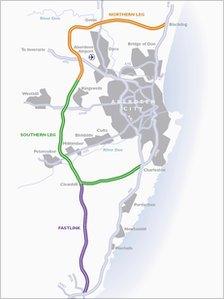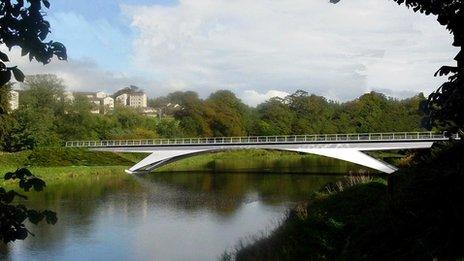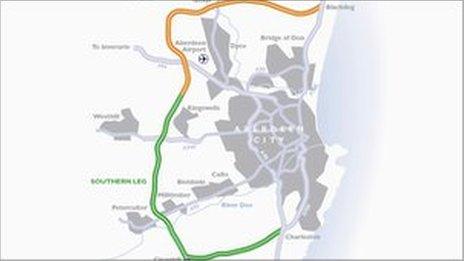Aberdeen bypass legal challenge refused by judges
- Published

Many business leaders in the area support the Aberdeen bypass
Campaigners trying to prevent the construction of the Aberdeen bypass have lost their legal challenge.
Opponents said they were "disappointed" at the decision of judges, external, but supporters have welcomed the ruling.
The 28-mile Aberdeen Western Peripheral Route (AWPR) was originally given the go-ahead by Scottish ministers in 2009.
Campaigner William Walton, from the protest group Road Sense, has been fighting to block construction of the £400m road.
He argued that the public inquiry into the project had been flawed, but this argument was rejected by a judge last year. Mr Walton then appealed against that decision.
The appeal, before judges in Edinburgh, was heard in December after it had been agreed that Mr Walton's costs would be covered, win or lose.
Road Sense argued the process of route selection was "fundamentally flawed and unjust".
However, many business leaders in the area support the scheme.
Mr Walton told BBC Scotland he was "disappointed" at the decision of the judges and may consider an appeal to the Supreme Court, but will consult members before making a final decision.
He said: "We will have to look at the judgement in detail."
Mr Walton added: "We still believe this road is unaffordable and ineffective."
Transport Minister Keith Brown said: "We welcome today's judgment. The Scottish government remain totally committed to the AWPR being built as soon as possible and we are pleased that we can now move forward with this project which is vital to the future prosperity of the north east and Scotland as a whole.
"It is hoped that the small number of objectors opposed to the AWPR will be willing to accept the decision, so that we can get on and build the road."
Aberdeen City Council leader Callum McCaig said: "The vast majority of citizens in the north east will hail this decision as great news for the region.
"We have all waited many years to reach this crucial stage - and now we must waste no more time and get on with construction.
"There is of course a period within which a further appeal could be lodged. But I am sure I speak for everyone who wants to see our city and shire thrive by calling on the small minority who oppose the route to accept that our argument has been won, to mount no more appeals, and to allow our shared region to reach its true potential."
Aberdeenshire Council leader Anne Robertson said: "I am delighted. The AWPR is of major strategic importance to the north east and we are keen to see the project progress as quickly as possible."
'Absolutely central'
North East Labour MSP Richard Baker said: "Now it is time to end the legal arguments and get on with the important work of building this vital transport initiative."
Tom Smith, chairman of Aberdeen City and Shire Economic Future said: "This vital infrastructure project which will significantly improve our road and public transport networks is now around five years behind schedule.
"Every extra day it is delayed is costing the business community, the tax payer and our local authorities more money."
Bob Collier, chief executive of Aberdeen and Grampian Chamber of Commerce, said: "The announcement is very welcome although not surprising.
"It is clear that this road will be built at some stage and all the legal challenges do is add to the overall financial cost and continue the congestion problems for everyone else in the region."
Derick Murray, director of regional transport partnership Nestrans, said: "We are delighted. Much more than a road, the AWPR is absolutely central to our vision of a modern-day network for the region and is the enabler to unlock a raft of significant projects across all transport modes."
'Overwhelmingly supported'
Ian Armstrong, the Scottish Council for Development and Industry's regional director, said: "The Western Peripheral Route is the most essential infrastructure project for maximising Aberdeen's competitiveness and the major contribution the city can make to national economic success in the long-term.
"The AWPR is overwhelmingly supported by businesses and the public, has been approved by the Scottish government, and appeals against it have now been rejected twice.
"It is time for opponents to accept these democratic and legal decisions, and for the Scottish government to get on with building the project for the good of the north east economy."
And Mike Salter, chairman of Scottish Chamber of Commerce, said it was "absolutely the right decision from the court."
He added: "It's time to finally get on and build this bypass, creating jobs and investment in the north east of Scotland."
- Published23 December 2011

- Published13 December 2011

- Published28 October 2011

- Published13 September 2011

- Published7 September 2011

- Published2 September 2011
